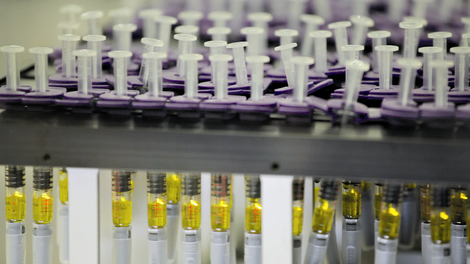Development centres for biotechnology

Saxony Anhalt impresses with densest research landscape in Germany
The search for a cure to Alzheimer's is one of the most ambitious research goals worldwide. By 2050, the number of dementia sufferers will have almost tripled, to 136 million people affected. Yet for ten years, no new medication has been approved for the treatment of Alzheimer's disease. A biotechnology company from Saxony Anhalt wants to change this. For more than 10 years, Probiodrug AG from Halle (Saale) has been researching a new therapy concept for the treatment of Alzheimer's dementia. The promising solution from Saxony Anhalt has attracted attention worldwide.
Development centres for biotechnology
The biotech company emerged as a spin-out of the Martin-Luther-University Halle-Wittenberg. Today, the headquarters of the research company is the “Weinbergcampus“ in Halle (Saale), one of the biggest founding and technology parks in Germany. Since 1990, more than €1 billion has been invested into the campus for companies, university and scientific institutions. Around 5,000 employees are currently employed there.
Probiodrug is just one example of how Saxony Anhalt relies on biotech, and creates the best establishment and founding requirements for the sector. The strengths of the federal state primarily include a solid infrastructure with affordable cost structures, the above average proximity to scientific expertise, and the networking of biotechnology protagonists. As part of the life science industry, the biotech industry is part of a leading market, which Saxony Anhalt specified in its “Regionale Innovationsstrategie Sachsen-Anhalt 2014-2020” [regional innovation strategy Saxony Anhalt 2014-2020] paper. Its declared objective is to become one of the European innovation leaders in this sector by 2020. Therefore, highly specialised development centres have been created for biotechnology in Saxony Anhalt. They offer companies from the whole spectrum of pharmaceutical, plant based and industrial biotechnology the ideal requirements. Apart from the Weinbergcampus with the bio centre, there is the biotech centre in Gatersleben, the BioPharmaPark Dessau, the central German chemicals triangle, or the Centre for Neuroscience Innovation and Technology (ZENIT) in Saxony-Anhalt’s regional capital of Magdeburg. Through these centres of development, competence regions have formed.
Specialists in red biotechnology
Above all specialists in the fastest growing biotechnology – red biotech – have made a name for themselves internationally. For example Icon Genetics GmbH in Halle. The company discovers and develops new biopharmaceuticals and high quality protein active ingredients by using plants as a production tool. The until now unique anti-Ebola serum ZMapp made from tobacco plants, that the plant researchers from Saxony Anhalt developed, hit the headlines. The molecular blueprint for the humanised Ebola antibodies is packed into tobacco mosaic viruses, and fed into the plants with the help of agrobacteria. One week later, the mass produced antibodies can be harvested from the leaves.
Europe-wide market leader in Protein Engineering
Navigo Proteins GmbH (formerly Scil Proteins) also from Halle (Saale), took advantage of the good establishment conditions on the Weinbergcampus, too. “Scientists on a worldwide competitive top level support us significantly in the development of innovative, highly complex and specific proteins for researching pharmaceuticals and diagnostics companies”, says Dr. Henning Afflerbach, CEO of Navigo Proteins GmbH. The biotechnology company is a specialist, and European market leader in the area of modification of proteins – protein engineering. Customers who commissioned certain proteins for biopharmaceuticals, also came from the USA and Canada.
Saxony Anhalt also became internationally known as a centre of biopharmaceutical knowledge due to IDT Biologika. The company is located in the BioPharmPark Dessau-Rosslau, which grew up around IDT. Here, for almost a hundred years, products and services have been developed to maintain the health of humans and animals. Today, IDT is one of the most innovative high-tech companies worldwide in the area of standardised production of biopharmaceuticals. The company employs around 1,700 people.
Competence in green and white biotechnology
Plant technology is a key competence in the German federal state of Saxony Anhalt. A success story in the “green” competence region of Saxony Anhalt is the biotech centre in Gatersleben. The location is traditionally rooted in plant research. The core of the biotech centre is the Leibniz-Institut für Pflanzengenetik und Kulturpflanzenforschung (IPK) [Leibniz institute for plant genetics and crop plant research], one of the internationally leading scientific establishments in this area. Amongst other things, it is home to the Federal Centre ex-situ gene bank for agricultural and horticultural crop plants, the largest gene bank with samples of crop plants from Europe and all over the world. In the biotech centre Gatersleben, the Bayer CropSciene group operates its European wheat growing centre.
In the “Central German chemicals triangle”, the heart of the East German chemicals industry, for example at the Fraunhof Centre for Biotechnological Processes (CBP), the focus is on “white”, industrial biotechnology. In a worldwide unique process, the French company Global Bioenergies wants to allow sugar to react with bacteria in such a way that hydrocarbons are formed, in a plant on a large technical scale. This also includes Isobuten, an important additive for fuels.
Networking and securing skilled personnel as a location advantage
An important location factor for biotech companies in Saxony Anhalt is the closely networked and dense research landscape. 2 universities, 3 universities of applied sciences and 10 research institutes of the Max-Planck, Fraunhof, Leibniz and Helmholtz associations concentrate strongly on the areas of enzyme and protein biotechnology and neurosciences. The universities and universities of applied sciences in the federal state, which offer numerous biotechnology relevant Bachelor and Masters courses, ensure academic education. An example of this is the founding of the Center of Life Sciences at the University of Applied Sciences Anhalt, which combines various branches of biotechnology, pharmaceutical technology and nutritional sciences. The University of Applied Sciences Anhalt also offers industrial biotechnology, bioprocess technology, algae biotechnology and active ingredient development as focuses.
Author: Michael Falgowski
